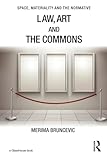Law, Art and the Commons
Material type: TextPublication details: New York: Routledge, 2018.Description: xiii,237pISBN:
TextPublication details: New York: Routledge, 2018.Description: xiii,237pISBN: - 9781138697546 (Hardback)
- 341 BRU
| Item type | Current library | Call number | Status | Date due | Barcode |
|---|---|---|---|---|---|
|
|
IUCIPRS General Stacks | 341 BRU (Browse shelf(Opens below)) | Available | IPR4332 |
Browsing IUCIPRS shelves, Shelving location: General Stacks Close shelf browser (Hides shelf browser)

|

|

|

|

|

|

|
||
| 341 BAE The contribution of international and supranational courts to the rule of law | 341 BAN Exploring private law | 341 BAS The concept of the common heritage of mankind in international law / | 341 BRU Law, Art and the Commons | 341 DOM The new global law | 34:1 DYZ Hobbes and the law | 34:1 DYZ.1 Hobbes and the law |
The concept of the cultural commons has become increasingly important for legal studies. Within this field, however, it is a contested concept: at once presented as a sphere for creativity, democratic access and freedom of speech, but one that denies property rights and misappropriates the public domain. In this book, Merima Bruncevic takes up the cultural commons not merely as an abstract notion, but in its connection to physical spaces such as museums and libraries. A legal cultural commons can, she argues, be envisioned as a lawscape that can quite literally be entered and engaged with. Focusing largely on art in the context of the copyright regime, but also addressing a number of cultural heritage issues, the book draws on the work of Deleuze and Guattari in order to examine the realm of the commons as a potential space for overcoming the dichotomy between the owner and the consumer of culture. Challenging this dichotomy, it is the productive and creative potential of law itself that is elicited through the book's approach to the commons as the empirical basis for a new legal framework, which is able to accommodate a multitude of interests and values


There are no comments on this title.